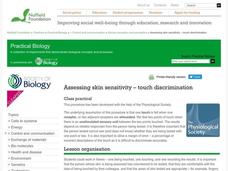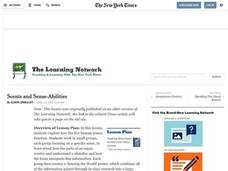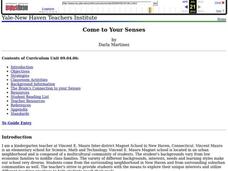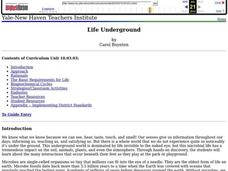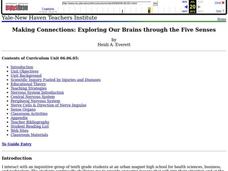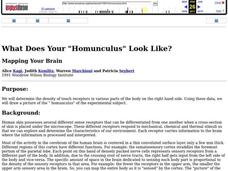Curated OER
Your Five Senses
Students identify the five senses. In this biology lesson plan, students participate in an experiment and use their five senses to identify various substances.
Nuffield Foundation
Assessing Skin Sensitivity—Touch Discrimination
How do we distinguish between the number of things touching our skin? Scholars explore an interesting lesson through an experiment. They learn that there must be an unstimulated sensory unit between two touches to distinguish them. They...
Curated OER
Scents And Sense-Abilities
Students explore how the five human senses function. They work in small groups, each group focusing on a specific sense. Each group then creates a 'Sensing the World' poster which combines all of the information gained through in-class...
Curated OER
Come to Your Senses
Students explore their senses. In this biology lesson plan, students will learn about their senses, what affects them, and how the brain works to control our senses in a series of lab activities.
Curated OER
The Five Senses
Students explore the 5 senses. For this biology lesson plan, students demonstrate the ability to identify objects through the use of the five senses as they complete 5 activities.
Curated OER
Fish Anatomy
Add a handy reference sheet about fish anatomy and functioning to your learners' biology or animal notebooks. Though this resource doesn't provide any practice, it makes a useful addition to any study of anatomy, biology, species, fish,...
Curated OER
Using the senses
Students use their senses to compare a frog and a hamster. In this animals comparison lesson plan, students get into groups and observe, smell, feel, and listen to what their animals are like, and classify them into categories.
Curated OER
Using My Senses
Students observe crickets in the terrarium. Have them record in their journal any evidence of crickets having senses. Then they answer questions like these: How do they use their sense organs? Where are they are located?
Curated OER
Making Connections: Exploring Our Brains through the Five Senses
Students record observations and create drawings and models of anatomy using their five senses. They describe the structures of a neuron and analyze each of their functions. They compare and contrast the typical structural features of a...
Curated OER
The Nervous System and the Effects of Drugs
In this senses activity, students use webbed information to answer several questions. Students read about each one of the five human senses in order to demonstrate an understanding of the material.
Curated OER
Making Sense of Things: The Human Body and Senses
Pupils conduct an experiment to evaluate the accuracy of their senses.
Curated OER
Brain and Senses
Students investigate the brain through multiple senses. In this biology lesson, students experiment with different activities involving taste, memory, touch, and sight to understand how the brain works. Students work in partners and...
Curated OER
Perception and Observation
Students use common and unusual objects to make observations of details, design, and functionality. They describe and draw each object while working in small groups. The differences between observation and perception is covered as part...
Curated OER
Life Underground
First graders build a terrarium in order to observe animal and plant life dynamics. In this biology lesson, 1st graders compare how organisms survive in different environments. They write their observations and analysis in their journal.
Curated OER
Taste Buds
Students investigate taste buds. In this biology activity, students taste several sweet, sour, and salty foods to identify how their taste buds play a role in how things taste.
Curated OER
Making Connections: Exploring Our Brains through the Five Senses
Students identify structures of the brain, and neurons and analyze their functions. For this nervous system lesson students create drawings and models of anatomy.
Biology Junction
Annelids: The Segmented Worms
Here's a lesson that just might make your class squirm! Learn about segmented worms in a detailed PowerPoint presentation including the wriggly earthworms young scientists dig up in their backyards. Although seemingly simple creatures,...
Curated OER
What Does Your "Homunculus" Look Like?
High schoolers investigate the density of touch receptors in various parts of the body. They discover how the body senses various stimuli, then maps a picture of the "homunculus" of the experimental subject.
Curated OER
Reptiles
In this reptiles worksheet, students identify and label the different parts of reptiles. They complete 10 short answer questions after reading the information provided in the worksheet.
Curated OER
Arthropods Crossword
In this arthropods activity, students complete a crossword puzzle with 41 questions about the different types and behaviors of arthropods.
Curated OER
What Does Your "Homunculus" Look Like?
Students determine the density of touch receptors in various parts of the body on the right hand side. They use collected data to draw a picture of the
"homunculus" of an experimental subject.
Curated OER
Coordination
Multiple choice, fill-in-the-blank, short answer, and matching questions are all here in a multi-page worksheet or quiz. While the formatting leaves a little to be desired, it would take just a few minutes to change the handout into a...
Curated OER
Quick Concept Demonstrations
Students research the nervous system. Demonstrations on how to pick up keyed information in text is shown daily and weekly. Reviewed for content is Nerve Impulse, Polarization and Depolarization and perception. A spreadsheet will graph...
Curated OER
"Investigating Soil Color and Texture"
Ninth graders will identify/understand the differences between soil and dirt. They will classify soil color accurately and use Munsell notation to describe it (Munsell books provided).Students will classify soil texture using the feel...



